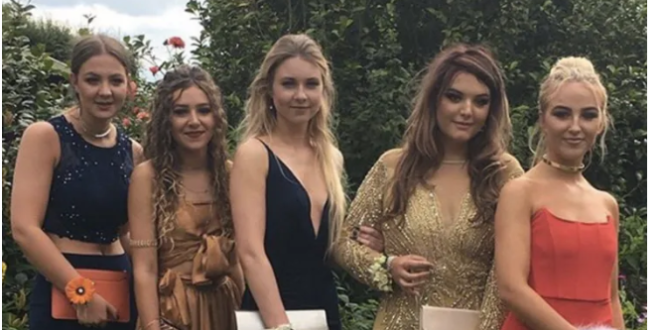The morning sun rose softly over Birmingham, casting a warm glow against the stone walls of St. Mary’s Church. Inside, the atmosphere felt uneasy and restless, filled with quiet whispers that floated through the air like drifting shadows. Guests exchanged glances, nudged one another, and tried—with little success—to hide their smirks. They had all shown up not out of excitement or joy, but out of curiosity. Many of them wanted to witness what people were already calling “the strangest wedding of the year.”

Standing at the front was Grace Johnson, a thirty-two-year-old Black woman dressed not in a wedding gown but in her nanny uniform. She couldn’t afford anything else. Her apron was pressed neatly, her hair pulled tightly into a bun, and in her trembling hands she held a small bouquet of daisies. Grace had spent most of her adult life caring for other people’s children—wealthy families who rarely remembered her name once they no longer needed her help. Still, she had always carried herself with quiet dignity, even when exhaustion weighed heavily on her shoulders.
The man waiting for her at the altar was Daniel Brooks. His suit was old, faded, and far too big for his thin frame. His shoes were cracked, his tie crooked, and his posture carried the weight of someone who had slept outdoors more nights than he could count. To nearly everyone present, he looked exactly like the rumors had said—a homeless man marrying a woman who deserved better.
The judgment in the room was nearly suffocating. On the left pew, Grace’s friends Melissa, Claire, and Janet whispered sharply to one another.
“I told her not to marry him,” Melissa muttered. “He looks like he sleeps wherever he falls.”
Claire scoffed. “He probably does. She’s throwing her life away.”
Janet shook her head with a smug smile. “This isn’t a wedding. It’s charity.”
The organ began to play as the pastor stepped forward. “Dearly beloved, we are gathered here today…” His deep voice echoed through the church, but the whispers didn’t fade. Grace heard the laughter hidden behind hands, the subtle sighs, the pitying looks from people who believed they were witnessing a mistake. Her stomach tightened, fear creeping up her spine, but when she looked at Daniel, his calm eyes steadied her. She squeezed his rough hand, drawing strength from his silence.
The ceremony continued. When it was her turn to speak, Grace’s voice trembled, but she pushed through. “Daniel, I promise to love you for who you are, not for what you have. I promise to see the best in you, even when others don’t.”
Somewhere in the back row, someone chuckled under their breath.
Then Daniel began his vow. “Grace, I may not have much—”
A ripple of laughter moved through the crowd. Melissa rolled her eyes loudly enough for half the room to notice. “At least he’s honest,” she whispered.
Grace’s cheeks burned, but Daniel didn’t flinch. He looked only at her, not at the people who had already judged him without ever knowing his story.
When he finished, the pastor was about to move on when Daniel raised a hand politely. “If it’s all right,” he said softly, “I’d like to say something.”
The pastor hesitated, then nodded and stepped aside.
Daniel walked toward the microphone. His worn shoes squeaked with each step, echoing down the aisle. He took a breath and scanned the room—seeing amusement, doubt, even mild disgust on several faces.
“I know what most of you are thinking,” he said quietly. “You see a man with nothing. No proper suit. No home. No family sitting here today. And maybe, to you, that makes me unworthy of standing beside her.”
A few people shifted awkwardly.
“These shoes,” he continued, lifting one foot slightly, “have walked to more shelters than I can remember. I’ve slept outside, looked for spare change, and lived through nights colder than words can describe. But one day, these same shoes led me to something I thought I had lost forever—hope.”
He turned toward Grace, his voice softening. “Grace didn’t look at me and see someone to pity. She saw a human being. The first day I met her, she gave me a sandwich. I hadn’t eaten in two days. She smiled at me like kindness was the most natural thing in the world. That moment saved me.”
Silence filled the room.
“But what none of you know,” Daniel added, “is that I wasn’t always like this. I used to design homes. I was an architect. I had a wife and a daughter. I built houses for families who never had to worry about losing them. And then one night… I lost my own family in a car accident. After that, I couldn’t step inside a house without feeling the walls close in on me. I walked away from everything. The streets became the only place I knew how to exist.”
Gasps traveled through the pews. The judgment melted from several faces.
Daniel swallowed hard. “Grace brought me back. Not with money, but with compassion. She reminded me that even a broken person can still be worth loving. I don’t have riches. I don’t have status. But I have something I never thought I’d feel again—a future.”
He looked at her with tears in his eyes. “Grace… you are my home.”
The church fell completely silent—until a single pair of hands clapped. Then another. And another. Within seconds, the entire room rose to its feet. Applause filled the church, echoing off the stained-glass windows.
Grace cried openly. Daniel wiped his eyes. Even the pastor looked moved.
After the ceremony, guests approached them—some apologizing, some humbled. Melissa hugged Grace awkwardly. “I misjudged him,” she murmured. Grace simply smiled.
News of their wedding spread quickly. Local papers called it “The Love That Silenced a Crowd.” Offers of support poured in, but Daniel and Grace accepted only a small apartment on the city’s edge.
Over the next few months, Daniel slowly returned to his profession—designing affordable homes for low-income families. Grace continued working as a nanny, her days brighter now, her heart lighter.
Sometimes she’d tease him. “Remember when everyone thought you were just a lost soul?”
Daniel would chuckle. “I was. But you saw me anyway.”
Every night, before bed, he whispered the same words: “You are my home.”
Their wedding wasn’t strange. It was a reminder that real love isn’t about appearances or status—it’s about two people choosing each other, even when the world doesn’t understand.
And no one ever laughed at them again.





